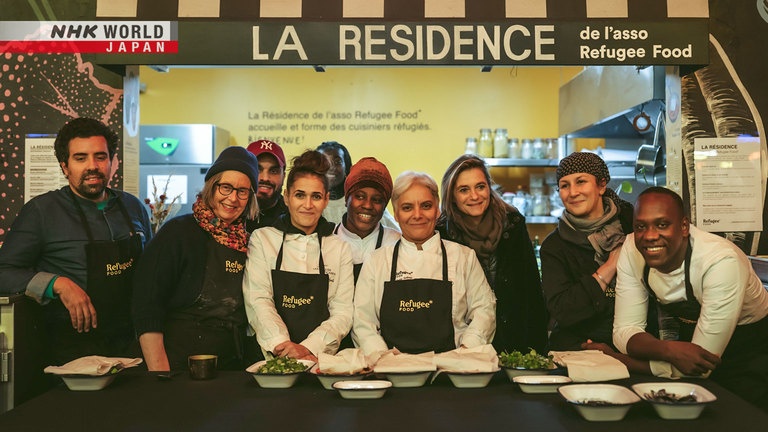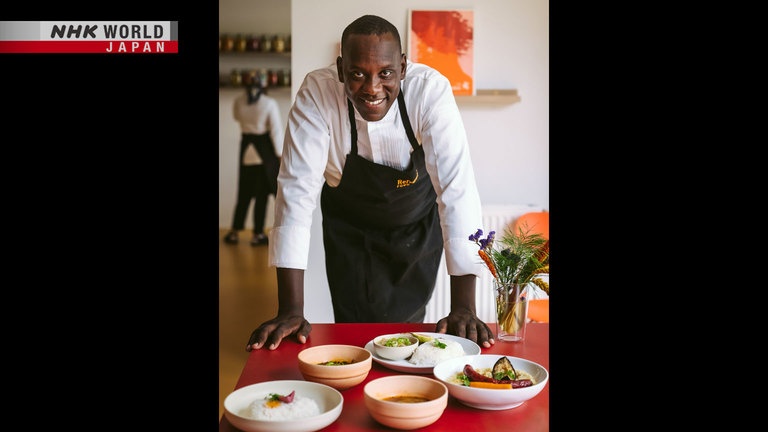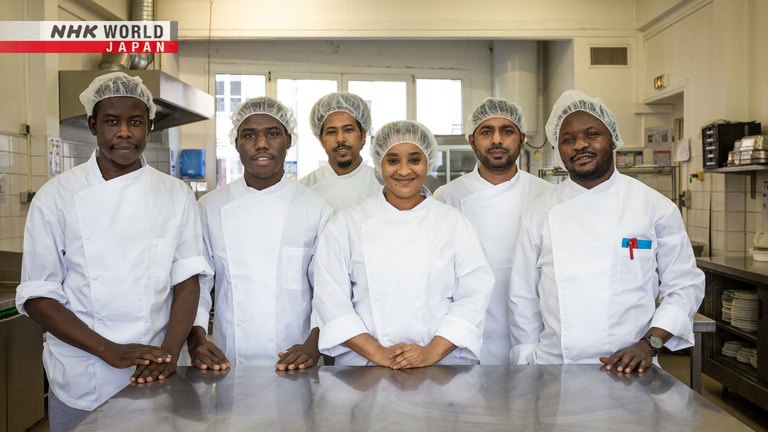Bringing Peoples Together: Louis Martin / Founder of Refugee Food
Louis Martin founded Refugee Food, an association that trains and employs refugee chefs. It promotes refugees' culinary know-how and supports their integration process within their host country, France.



Transcript
Direct Talk
Calais, France
Since 2015, huge numbers of refugees
have arrived in southern Europe.
Many came desperately fleeing war,
dictatorships, famine, and global warming.
But without proper systems to receive them,
spontaneous settlements sprang up.
France is very culturally diverse
with over 7 million immigrants.
But some people still find it hard
to accept newcomers.
That means refugees
can find it hard to get settled
and find work.
And we think it's our duty to offer them
dignified and supportive reception conditions
so that they can rebuild their lives
or at least benefit from a fresh start
in their host society.
To support refugees get set up
in their adopted country,
Louis Martin and his partner Marine
came up with an idea.
Using the universal topic of food –
their project helps refugees making a living
with recipes from their country of origin.
They called it Refugee Food.
And over a few years it has flourished.
Its many initiatives, like festivals,
integration restaurants,
and professional trainings,
are helping more and more refugees
find a place at society's table.
Louis talked with us
about the creation of Refugee Food,
and why it's putting smiles on
so many people's faces.
Marine Mandrila and I
co-founded Refugee Food in 2016.
We both have a fairly classic background.
We went to the same business school.
Both of us were passionate
about cooking and food.
Actually Marine's thesis looked at
the relationship between food and culture,
focusing on what it says of a society.
We decided to embark on a big project
that combined food with traveling.
so we devised our
very own round-the-world trip
with this specific approach in mind.
Our aim was to try to cook and eat
in the homes of those
we would encounter along the way.
Cooking was a way for us
to get closer to people,
hoping to discover how they lived
on a day-to-day basis.
Why did we come up with this idea?
Food and culinary traditions are part of
the world's intangible cultural heritage.
They're both universal because
we all have to cook in one way or another,
I mean every single society has to cook –
and very singular at the same time,
in the sense that they tell
a lot about who we are,
where we come from,
our history,
and our identity.
We've documented this whole adventure
in a book that recounts our long journey.
Louis and Marine came back to Paris as the
2015 European migrant crisis was at its peak.
Shocked by the hostile reception
refugees had to face,
they decided to act to change attitudes.
We decided to create something
around kitchens and thought that it could be
an opportunity to try to change the way
people look at refugees,
a way of countering the miserabilist approach
and anxiety-provoking discourse
that too often prevail about refugees.
We wanted to highlight the fact
that behind our image of a compact mass
pouring into Europe,
they are actually people like you and me
who are fleeing war and persecution.
We must never forget that
these people do not leave their country
in order to search for
better opportunities elsewhere,
but rather to basically save their lives.
This is when Louis and Marine
created the Refugee Food Festival,
a culinary event forging collaborations
between refugee chefs
and Parisian restaurants.
Our idea was fairly simple.
We wanted to use the food sector
to put the spotlight onto refugee chefs
who'd arrived in the country,
and promote their skills.
In 2016, Paris hosted the first edition
of the Refugee Food Festival.
Among the 11 collaborating restaurants
was everything –
from three-star restaurants
to local cafes.
For one service or more,
the guest chefs get to make recipes
from their country of origin,
bringing their culinary traditions
and also cultural heritage to the table.
The Refugee Food Festival shot to success.
Praise for the initiative
filled the newspapers.
As a result the next year saw the project
extended to the whole of France.
Today, the festival happens
across Europe, and beyond!
In each participating city,
over 100 restaurants take part.
But Louis and Marine
didn't rest on their laurels.
They wanted to capitalise on
this early success.
Refugee Food started
opening restaurants in Paris
of a new kind.
Today, Refugee Food has three main goals.
First of all, it's about changing the way
people look at refugees.
Secondly, it's an opportunity to speed up
refugees' professional integration
within their host society.
And finally, it's about offering fair,
sustainable, and quality food to everyone.
The project encompasses
three different initiatives,
including this restaurant
called "The Shrubs Canteen,"
which we opened in September 2022.
It's a new kind of social restaurant.
Everyone here eats the same thing
but not at the same price.
People eat according to their means.
Those who are in need can come
and eat for free or for a reduced price,
whereas those from the neighbourhood
will be charged a normal price.
It's a social integration restaurant
where everything's cooked
and prepared by refugees
who are qualified cooks,
and supervised by a chef who's a refugee too.
The kitchen team includes
refugees from places like Mauritania,
Afghanistan, and Syria
who may or may not have had
culinary experience back home.
Refugee Food gives them
six-month to two-year contracts.
First they learn French.
And then, they get familiar with
the codes of French cuisine,
and commercial kitchen requirements.
So far, with these training courses,
Refugee Food has supported over 500 refugees.
But the graduates
don't just get a certificate.
80% have also found a job afterwards.
The Shrubs Canteen's menu is varied,
reflecting the kitchen team's
diverse nationalities.
Recipes are adapted slightly
to suit French palates.
But the chefs' culinary heritage
is proudly highlighted.
The result can be flavour combinations
that are unusual and delicious.
The high-quality cuisine is made from
healthy and seasonal ingredients.
And there's something for everybody.
We also use this place as a laboratory
to produce meals for people
who live in food-insecure households.
We developed this initiative in Paris
during the Covid 19 crisis.
The traditional food aid supply chains
got really disrupted during lockdowns
and the number of vulnerable people
increased dramatically in the capital.
So we decided to use our skills
and expertise in order to help these people,
and we turned our ovens back on!
Prepared with great care,
food aid provides vulnerable people
who have nothing to eat
with balanced quality meals.
Kitchen teams put value on aesthetics –
the meals must look like
they've come from a real restaurant.
I'm head trainer and head chef
in the association.
Some members of our team,
including myself,
have relied on food aid before,
so it means a lot to us
to get to help others now.
There are about 20 cooks,
including supervisors, and many different
nationalities, that's our strength.
We all come from different backgrounds,
yet we're all determined to go further,
learn, and share.
Every day we gain in strength
as new people join our team.
They're either interns
coming from our training centres
or people on the job market that
we've recruited to provide support.
They all come with their culinary baggage
and culture which they share with us.
We teach them new skills, know-how,
as well as French cuisine techniques.
With the help of volunteers,
Refugee Food prepares between
500 and 1,000 meals every day.
Partner associations then distribute them
to vulnerable people living on the street.
Two to four million people rely on
food aid distribution in France.
And the number keeps on increasing.
In the 12th district of Paris,
we've also set up a restaurant dedicated
to refugee chefs who are entrepreneurs.
It's called La Residence.
We provide refugees who want to set up their
own restaurant with a professional kitchen
so that they can try out their menu,
familiarise themselves with
all of the different aspects
involved in running a restaurant in Paris,
build up their network of suppliers,
and get support from our team
to develop and launch their project.
It's called La Residence
because it works a bit like
artistic residencies:
they're invited to spend four to six months
in the restaurant, as chefs in residence.
A team of refugees with kitchen experience
undergoing their professional integration
works with them throughout the project.
Refugee Food organises public events,
bringing committed people together,
such as this solidarity couscous.
It's also good practice
for the resident chefs!
Several restaurants have opened in Paris
since 2018, thanks to this initiative.
One of our greatest successes is
probably Magda Gegenava's restaurant.
She's a Georgian chef
who hadn't trained professionally.
She had no previous experience in the sector.
She was a dentist who loved food and cooking.
With us, she trained from scratch,
became a chef,
and then went on to open her own restaurant
in the 19th district called Magda's.
Magda Gegenava worked as a dentist in Georgia
and had her own successful clinic.
Yet following the Russian invasion in 2008,
she had to flee the country
with her four children.
Today, her small restaurant is said
to serve the best Georgian food in Paris.
Refugee Food helped me open
this street-food restaurant.
It's a brand new concept.
Usually, street food is essentially
burgers or sandwiches.
Yet here we serve Georgian cuisine,
prepared in a proper kitchen.
We've got a mini kitchen
so we can make traditional Georgian food
that's only found in our country.
We've worked at a lot of events
with our catering service.
We always bring a little taste of Georgia
and people do show interest.
This job brings me a lot of joy.
People thank me.
They say it's delicious!
It touches me a lot.
Do you know dentists
who get thanked for what they do?
No, you don't!
This job is just radically different!
Chef Magda has a bright
and tasty future ahead!
We've also been interested in
addressing the younger generation
as we thought it was important to reach out
to those who will build tomorrow's society.
So we've set up a pilot project
called Refugee Food Education,
launched in secondary schools in Marseille.
It works like our festival,
that is to say we invite refugee chefs
to cook in school canteens.
It happens in collaboration
with school principals and teachers,
on specific days dedicated
to professional development.
Throughout the event, we get to connect
with the kids in different ways.
It's an opportunity for us
to raise their awareness
about refugees' professional
and social integration.
We can really see that this programme
has changed people's perception.
So we're very proud of this pilot project.
Now we want to extend
the initiative across France
and perhaps even beyond, one day.
What are Refugee Food's main goals today?
Our project has developed a lot since 2016.
Around 30 people work full time within the
association across the different programmes,
conveying our messages,
promoting our values,
and developing our actions.
Beyond Refugee Food's employed staff,
there are also hundreds of volunteers –
almost thousands –
working alongside us.
It feels like a whole ecosystem
has flourished around Refugee Food,
supporting the different projects
and allowing them to develop.
One of our challenges now is to
keep this community excited and motivated,
and to encourage them to continue to spread
the project's values as widely as possible.
In his work,
Louis is guided by a powerful mission.
I wish to live in a more inclusive society
and I wish for all the people
fleeing war and persecution
to be welcomed with dignity
everywhere around the world.